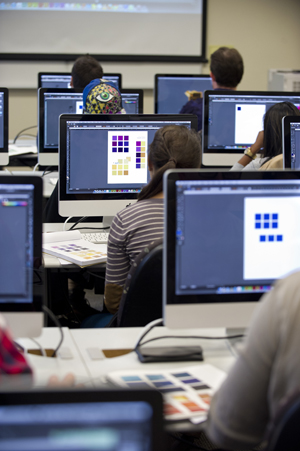New Team Will Power BU’s Online Education
Digital Learning Initiative: president’s council key recommendation

A faculty-led team, helmed by a School of Management expert on information technology, will guide BU across the new terrain of enhanced online education.
Chrysanthos Dellarocas, an SMG professor and chairman of information systems, will lead the new Digital Learning Initiative (DLI). The DLI will develop online courses called MOOCs (massive open online courses), which will be available to people around the world whether or not they are matriculated BU students. It will also distribute seed grants this fall to faculty to craft innovative online education on campus, for BU students living on and off campus.
The two-pronged strategy was part of President Robert A. Brown’s charge last year to the newly appointed Council on Educational Technology & Learning Innovation (CETLI). The DLI was the first recommendation in CETLI’s just-released report. The council’s 20 members, 17 of them professors, conducted months of meetings and faculty forums, reaching out to educators on both BU campuses, to produce its 23 pages of findings and recommendations.
Several of those recommendations, including creation of the DLI, complement actions already under way after the University joined edX, the online learning initiative run by a consortium of schools. For example, edX membership requires the University to design five MOOCs, which are free and open to students globally; the DLI will develop those MOOCs over the next year.
The DLI also will distribute $400,000 in seed grants to professors who submitted ideas for creative uses of educational technology. The goal is to produce sustainable initiatives fulfilling Brown’s goal of improved online education for residential students, says CETLI cochair Azer Bestavros, a College of Arts & Sciences professor of computer science and director of the Rafik B. Hariri Institute for Computing and Computational Science & Engineering, which will house the DLI.
The number of grants will be decided in the next several weeks, during which time about 10 proposals that faculty submitted to CETLI last spring will be further developed and analyzed for cost, says CETLI cochair Elizabeth Loizeaux, associate provost for undergraduate affairs. By creating the DLI, “BU is making an important start on an exciting experiment in new uses of online technology to improve education,” she says. “There is much discussion about our direction still to be had with faculty and staff.”
Given online education’s embryonic nature, CETLI’s report urges the University to proceed cautiously, while also warning against overcaution, Loizeaux notes.
The report, Brown says, “makes a compelling case that advances in digital learning software environments, internet availability, and hardware technology are the means for a fundamental transformation of how we may improve the quality of residential education and reach new cohorts of students beyond our campus.”
CETLI’s report suggests staffing the DLI with at least a half dozen people—a director, an associate director, course designers, and software developers—plus fellows from among students, industry, and faculty from BU and other universities. The associate director will be a new hire for the University, Dellarocas says, while the other spots may be new employees or recruited from among current BU staff.
To develop each MOOC, he says, the DLI will assign an amply staffed production team: one or more instructors, a teaching assistant, a learning designer, a graphic designer, a software developer, and a videographer. A MOOC will be born in three stages. First, the team will develop course materials, storyline, and flow, he says. Second, the team will record lectures and other video sessions, while graphics, simulations, and problem sets are created and all course materials are integrated into edX’s platform. Finally, the MOOC will be tested, both by DLI and with a group of BU students, before being publicly released.
“Some courses will be based on videographed lectures captured in actual lecture halls,” Dellarocas says, “and some will require dedicated video sessions captured at a different setting,” perhaps a lab or the instructor’s office. “Some courses may include simulations or interactive problem sets that involve the development of software.”
Dellarocas earned master’s and doctoral degrees in computer science from MIT and sits on the boards of two information systems journals. “Professor Dellarocas will bring creativity, thoughtfulness, and spirit to the leadership of this important new initiative,” Loizeaux says.
Brown says other CETLI recommendations will be considered this fall after consultation with the faculty. He says that the University Council and the faculty must weigh “critical policy questions” arising in the digital age.
“One is how to define ownership of digital material that is produced with the use of significant University resources,” the president says. “A second question is how to define the boundaries of faculty teaching in the context of new opportunities for participating in digital learning for nontraditional student cohorts with entities other than Boston University.”
Other CETLI recommendations include pooling BU’s existing but disparate resources for improving courses via digital technology; establishing a new and ongoing funding program to continue the innovation-producing efforts of the seed grants; and retaining a reconstituted CETLI to steer BU’s technology efforts, advised by a board of experts that would include edX staff, among others.
CETLI’s report discusses both the potential and the challenges of online education. In the former category: “Developing high-quality online courses and other online content advances the commitment in BU’s strategic plan to developing a special undergraduate educational environment that ‘combines our commitment to a liberal arts and sciences education with professional opportunities, while creating flexible educational opportunities to leverage the depth of CAS and our other schools and colleges.’”
Comments & Discussion
Boston University moderates comments to facilitate an informed, substantive, civil conversation. Abusive, profane, self-promotional, misleading, incoherent or off-topic comments will be rejected. Moderators are staffed during regular business hours (EST) and can only accept comments written in English. Statistics or facts must include a citation or a link to the citation.